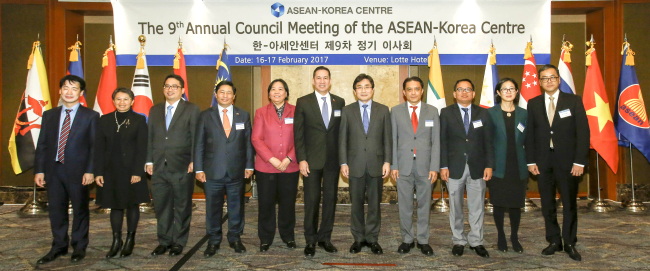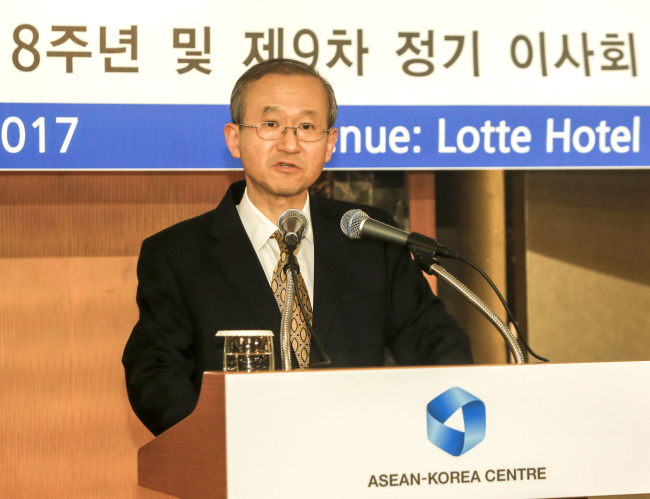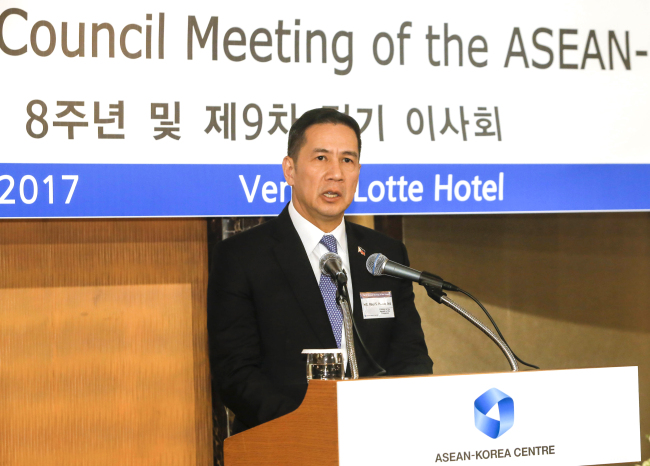The ASEAN-Korea Center in Seoul held its ninth annual council meeting Thursday, hashing out issues to strengthen bilateral ties while commemorating the 50th anniversary of the Association of Southeast Asian Nations.
As this is the ASEAN-Korea Cultural Exchange year, events are scheduled on both sides, particularly in May and June. The discussion involving 11 high-level representatives from ASEAN and Korea focused on bolstering two-way cultural ties, according to the center.
At the reception at Lotte Hotel in Seoul on Thursday, some 150 guests representing diplomatic, political and business communities, academia, media and cultural institutions participated.
 |
Diplomatic representatives of the Association of Southeast Asian Nations and Korea pose for a photograph following the annual council meeting of the ASEAN-Korea Center in Seoul on Thursday. (ASEAN-Korea Center) |
“I want to thank the decision made by ASEAN representatives to make financial contributions, so that people will be given more opportunities to work at the center,” said Lim Sung-nam, Korea’s first vice foreign minister, in a speech.
“This will ensure that the needs of ASEAN member states are fully reflected in future programs. It will take us closer to realizing the center’s vision, that of building a lasting and genuine partnership between ASEAN and Korea.”
Over the past half century, the multilateral organization -- comprising Indonesia, Malaysia, the Philippines, Singapore, Thailand, Brunei, Cambodia, Laos, Myanmar and Vietnam -- has played an “unprecedented role” in bringing nations closer together diplomatically, economically and culturally, Lim added.
 |
Lim Sung-nam, Korea’s first vice foreign minister (ASEAN-Korea Center) |
With the launch of the ASEAN Community in 2015, the 10-member bloc would play a greater and more meaningful role in regional peace and prosperity, the diplomat said. He added that ASEAN is poised to become the fourth-largest economic bloc by 2050, growing from today’s combined population of 635 million and average annual growth of 5 to 6 percent.
Later this year, the ASEAN Culture House will be inaugurated in Busan, the sole institution of its kind outside Southeast Asia.
ASEAN and Korea established their Sectoral Dialogue Partnership in 1989. Since then, ASEAN has become Korea’s second-largest trade partner and investment destination after China, with bilateral trade reaching nearly $120 billion last year and expected to top $200 billion by 2020.
“The Philippines has the duty and honor to preside over the jubilee year with our chairmanship, which we consider another milestone in ASEAN’s continuing cooperative narrative,” said Philippine Ambassador to Korea Raul S. Hernandez.
 |
Philippine Ambassador to Korea Raul S. Hernandez (ASEAN-Korea Center) |
“ASEAN has become the world’s seventh-largest economy with the third-highest growth rate and labor force in the world. Its viability as a stable and prosperous regional community is made possible only with the cooperation and support of our member states and dialogue partners, such as the Republic of Korea.”
Hernandez said that both sides recently agreed to speed up negotiations for upgrading the ASEAN-Korea free trade agreement, which took effect 10 years ago. He added that Manila was committed to concluding negotiations on the Regional Comprehensive Economic Partnership, a proposed free trade agreement between ASEAN and the six states with which it has free trade agreements -- Australia, China, India, Japan, South Korea and New Zealand.
By Joel Lee (
joel@heraldcorp.com)










